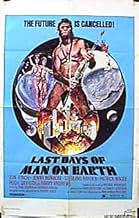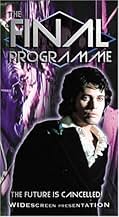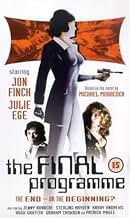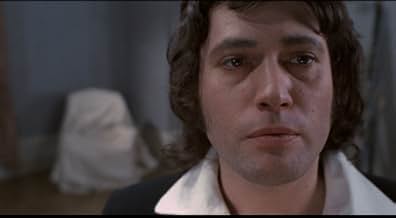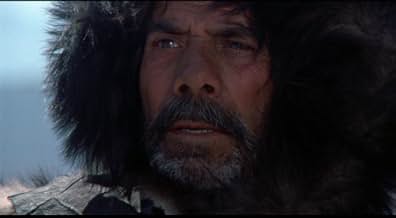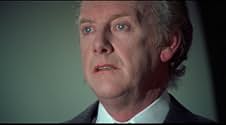IMDb RATING
5.4/10
1.2K
YOUR RATING
A trio of scientists plan to create a self-replicating, immortal, hermaphrodite using the Final Programme developed by a dead, Nobel Prize-winning scientist.A trio of scientists plan to create a self-replicating, immortal, hermaphrodite using the Final Programme developed by a dead, Nobel Prize-winning scientist.A trio of scientists plan to create a self-replicating, immortal, hermaphrodite using the Final Programme developed by a dead, Nobel Prize-winning scientist.
- Awards
- 1 win & 1 nomination total
Sandy Ratcliff
- Jenny
- (as Sandy Ratcliffe)
Mary MacLeod
- Nurse
- (as Mary Macleod)
Delores Delmar
- Fortune Teller
- (as Dolores Del Mar)
- Director
- Writers
- All cast & crew
- Production, box office & more at IMDbPro
Featured reviews
Very stylish tongue-in-cheek sci-fi. I don't recall it being a midnight movie in the 70s or 80s, though it should have been a cult classic here in the U.S.
After watching it for the first time last night, I can understand why it didn't see much action on American TV: it is permeated with drug use, irreverence toward religion, nudity, and generally perverse attitudes. As noted by others, it is in the style-sphere of "Modesty Blaise" and "The Avengers" (for which director Fuest wrote and directed in the Linda Thorson and Joanne Lumley eras.) The movie looks great, especially considering the small budget.
As a computer programmer, I took it as a nice joke that the computer is depicted as a realistically nondescript box, rather than the usual sci-fi flashing-light monstrosity.
Jon Finch seems like a lost member of Led Zeppelin, charismatic, offhand and saturnine. Jenny Runacre plays the imperious Miss Brunner (a nod to SF writer John Brunner?) with a lot of relish.
Nice to see two Kubrick actors here: Sterling Hayden (Gen. Jack Ripper in "Dr. Strangelove") and Patrick Magee from "Clockwork Orange". Also, George Coulouris from "Citizen Kane" and a young Sarah Douglas, who later played one of the Kryptonian criminals in the "Superman" series.
On the DVD commentary, it is mentioned that Eric Clapton performed the blues guitar on the soundtrack. He is not credited, but the two composers for the film, Beaver and Krause, share music credits with Cream on a 1970 picture, "Pacific Vibrations". So it seems plausible, and I wonder if the solo drum portion of the soundtrack might then be Ginger Baker? Jazz baritone saxist Gerry Mulligan's contribution is wonderful. The diverse music is a strong point of the film.
The ending didn't really pay off for me. Maybe it was intended to be a sly nod to "2001"; maybe they just needed to wind things up. But I found the movie very worth seeing.
After watching it for the first time last night, I can understand why it didn't see much action on American TV: it is permeated with drug use, irreverence toward religion, nudity, and generally perverse attitudes. As noted by others, it is in the style-sphere of "Modesty Blaise" and "The Avengers" (for which director Fuest wrote and directed in the Linda Thorson and Joanne Lumley eras.) The movie looks great, especially considering the small budget.
As a computer programmer, I took it as a nice joke that the computer is depicted as a realistically nondescript box, rather than the usual sci-fi flashing-light monstrosity.
Jon Finch seems like a lost member of Led Zeppelin, charismatic, offhand and saturnine. Jenny Runacre plays the imperious Miss Brunner (a nod to SF writer John Brunner?) with a lot of relish.
Nice to see two Kubrick actors here: Sterling Hayden (Gen. Jack Ripper in "Dr. Strangelove") and Patrick Magee from "Clockwork Orange". Also, George Coulouris from "Citizen Kane" and a young Sarah Douglas, who later played one of the Kryptonian criminals in the "Superman" series.
On the DVD commentary, it is mentioned that Eric Clapton performed the blues guitar on the soundtrack. He is not credited, but the two composers for the film, Beaver and Krause, share music credits with Cream on a 1970 picture, "Pacific Vibrations". So it seems plausible, and I wonder if the solo drum portion of the soundtrack might then be Ginger Baker? Jazz baritone saxist Gerry Mulligan's contribution is wonderful. The diverse music is a strong point of the film.
The ending didn't really pay off for me. Maybe it was intended to be a sly nod to "2001"; maybe they just needed to wind things up. But I found the movie very worth seeing.
This is one of those spectacular misfires; Fuest has taken Moorcock's splendid book and cut everything down to the bone so much that what remains is only the irrelevant sci-fi plot that was basically a throwaway excuse to hang all the elements of the book together. For this there really is no excuse; the next two books were available at the time the film was in production (the last was not publish until 1977) and if anyone had bothered to read them, they would have realized that Jerry Cornelius ain't James Bond. This a cheap Bond rip-off. The books were trans-dimensional, time hopping wonders; they had an arrogance of plot structure that really captured the complexities of multi-dimensional realities. This is a chase movie. It has a conventional three-act structure and, worst still, it ditches all the characters vital to the novel (or amalgamates three, four or five of them into one). It misses out on Moorcock's views of sexual liberation and worst of all Fuest has absolutely no idea what his source material is about. After seeing the Dr. Phibes movies I thought him to be an entertaining and imaginative director. After seeing this I realize his style has nothing to do with imagination but a talent for making do with low budgets. The Final Programme was made for around £600,000. Not inconsiderable for the time but it is wasted in every frame on trivia. For example, an early chapter of the book revolves around a massive assault on Jerry's father's Chatauex in Normandy by a team of crack armed mercenaries with hundreds of casualties; here it is reduced to a bit of mild house breaking just outside London. Jon Finch's Cornelius is the only plus point about it (he was, after all, a friend of Moorcock) and what the books really need is $400 million throwing at them (they have to be filmed back-to-back), faithful adaption, and a director like Alejandro Jodorowsky. The books have recently been reissued in a bind-up as "The Cornelius Quartet". Read them; you'll be going back to them for years to come trying to unravel all the different strands. The film has no strands.
I first saw this film when it came out in 1973, and just watched it for the second time on DVD. Excellent production values and camera work. Stars Jon Finch as androgynous (but heterosexual) dandy-dressing Jerry Cornelius, with black nail polish; looks a bit like a cross between an older Johnny Depp and Billy Zane. Also stars Sterling Hayden, Julie Ege and the evil (duh) Nazi guy from "Raiders of the Lost Ark". The film itself is a cult science fiction fantasy in the best tradition of the late '60's - early '70's, with similarities in style to The Prisoner, early James Bond (slightly), Clockwork Orange, The Abominable Dr. Phibes, and The Avengers (the director worked on the last two of those also). It is years ahead of its time in theme and science, but lapses into camp several times, especially as it progresses. It is rather disjointed, but the acting and sets are both good. Based on a story by Michael Moorcock.
Sort of like Zardoz crossed with Planet of the Apes.
The film is well acted, well shot, and the plot holds together... even though the Nazis are dragged in a bit, but not to the detriment of the film.
It is allegorical, and rather clever twist on some poetry for those who have taken Humanities classes in school.
Worth a look if you are new to film, and are looking for something out of the ordinary, that requires a bit of knowledge to hang with.
The film is well acted, well shot, and the plot holds together... even though the Nazis are dragged in a bit, but not to the detriment of the film.
It is allegorical, and rather clever twist on some poetry for those who have taken Humanities classes in school.
Worth a look if you are new to film, and are looking for something out of the ordinary, that requires a bit of knowledge to hang with.
A simplification - albeit a rather offbeat one - of one book in a series of novels by Michael Moorcock, "The Final Programme" may work better for people who haven't read the novel. Therefore, they can appreciate it for what it is, and not fret about what it isn't. This viewer admits that it took a while to grab hold for him personally, but it's just quirky enough and provocative enough to make for a reasonably entertaining movie. I would be surprised if it didn't have some sort of cult following by this point.
Jon Finch ("Frenzy") is front and centre here as the character Jerry Cornelius, a sardonic scientific genius living in a world on the possible brink of apocalypse. He gets involved in the hunt for some valuable microfilm. It contains a revelatory formula (devised by his late father) for creating a self-replicating human being, and possibly a new Messiah. Jerry must deal with a comely but conniving computer expert (Jenny Runacre, "The Witches"), and the machinations of his weaselly brother Frank (Derrick O'Connor, "Lethal Weapon 2").
The first-rate supporting cast includes Sterling Hayden ("The Godfather") in a brief cameo as a wheeler-dealer American major, Harry Andrews ("The Hill"), Hugh Griffith ("Ben-Hur"), the stunning Julie Ege ("Creatures the World Forgot"), Patrick Magee ("A Clockwork Orange"), Graham Crowden ("The Company of Wolves"), George Coulouris ("Citizen Kane"), Ronald Lacey ("Raiders of the Lost Ark"), and Sarah Douglas ("Superman" and "Superman II"). Finch is amusing as a protagonist who's always quick with the pointed comments, and Runacre is enticing as the woman determined to see her plan through. (She also has a tendency to *consume* her lovers.)
Complete with sex, nudity, action, and a bit of globe-trotting, "The Final Programme" also benefits from the striking visual approach by production designer / screenwriter / director Robert Fuest, whose other 70s feature films include the "Dr. Phibes" movies, "And Soon the Darkness", and "The Devils' Rain". Bizarre and stylish, it can get goofy at times, but it's definitely not boring.
Seven out of 10.
Jon Finch ("Frenzy") is front and centre here as the character Jerry Cornelius, a sardonic scientific genius living in a world on the possible brink of apocalypse. He gets involved in the hunt for some valuable microfilm. It contains a revelatory formula (devised by his late father) for creating a self-replicating human being, and possibly a new Messiah. Jerry must deal with a comely but conniving computer expert (Jenny Runacre, "The Witches"), and the machinations of his weaselly brother Frank (Derrick O'Connor, "Lethal Weapon 2").
The first-rate supporting cast includes Sterling Hayden ("The Godfather") in a brief cameo as a wheeler-dealer American major, Harry Andrews ("The Hill"), Hugh Griffith ("Ben-Hur"), the stunning Julie Ege ("Creatures the World Forgot"), Patrick Magee ("A Clockwork Orange"), Graham Crowden ("The Company of Wolves"), George Coulouris ("Citizen Kane"), Ronald Lacey ("Raiders of the Lost Ark"), and Sarah Douglas ("Superman" and "Superman II"). Finch is amusing as a protagonist who's always quick with the pointed comments, and Runacre is enticing as the woman determined to see her plan through. (She also has a tendency to *consume* her lovers.)
Complete with sex, nudity, action, and a bit of globe-trotting, "The Final Programme" also benefits from the striking visual approach by production designer / screenwriter / director Robert Fuest, whose other 70s feature films include the "Dr. Phibes" movies, "And Soon the Darkness", and "The Devils' Rain". Bizarre and stylish, it can get goofy at times, but it's definitely not boring.
Seven out of 10.
Did you know
- TriviaA few years after making this film, Sterling Hayden was interviewed for a British magazine and insisted that Robert Fuest was his favorite director, the best he had ever worked with. As Hayden has only one scene in this film, and almost certainly took no longer than a couple of days to film it, perhaps less, and as he also spoke in the same interview about his work with Stanley Kubrick, John Huston, Bernardo Bertolucci, Robert Altman and Nicholas Ray, it may be that he was being sarcastic.
- Quotes
Nurse: It's much easier to run a hospital with all the patients sleeping.
Jerry Cornelius: Easiest way to run the world, for that matter.
- ConnectionsFeatured in Nightmare Theatre's Late Night Chill-o-Rama Horror Show Vol. 1 (1996)
- How long is The Final Programme?Powered by Alexa
Details
- Release date
- Country of origin
- Language
- Also known as
- The Last Days of Man on Earth
- Filming locations
- Production companies
- See more company credits at IMDbPro
Contribute to this page
Suggest an edit or add missing content

